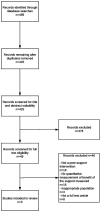Impact of peer support on student mental wellbeing: a systematic review
- PMID: 38074560
- PMCID: PMC10701817
- DOI: 10.15694/mep.2018.0000170.1
Impact of peer support on student mental wellbeing: a systematic review
Abstract
This article was migrated. The article was marked as recommended. Objectives: Many universities use peer support programmes to support students. However, there are currently no guidelines on the most effective way of facilitating emotional wellbeing in students. The aim of this paper is to review the evidence for the effectiveness of peer support to improve mental health wellbeing in university students. Methods: Six electronic databases (Medline, Embase, British Education Index (BEI), Australian Education Index (AEI), PsychINFO and Applied Social Sciences Index and Abstracts (ASSIA)) were searched in December 2017. Search terms included "peer support", "university students" and "mental wellbeing". Studies that did not include peer support or assess the impact of students' mental health were excluded. Data about design and delivery of the peer support intervention and changes in student mental wellbeing outcomes were extracted. Results: 489 records were identified. Three studies met the inclusion criteria; two cross-sectional surveys and one non-randomised intervention study. One study found social support to be the most important protective factor for mental wellbeing. Two studies showed no statistically significant improvement in wellbeing outcomes with peer support. One study found that majority of mentors and mentees found peer support useful. Conclusions: There is currently no evidence that peer support improves mental wellbeing among university students.
Keywords: mental health; peer support; university students; wellbeing.
Copyright: © 2018 John NM et al.
Figures
References
-
- Bernardon S. Babb K.A. Hakim-Larson J. and Gragg M.(2011) Loneliness, attachment, and the perception and use of social support in university students. Canadian Journal of Behavioural Science / Revue Canadienne des Sciences du Comportment. 43(1), pp.40–51. 10.1037/a0021199 - DOI
Publication types
LinkOut - more resources
Full Text Sources
Miscellaneous


